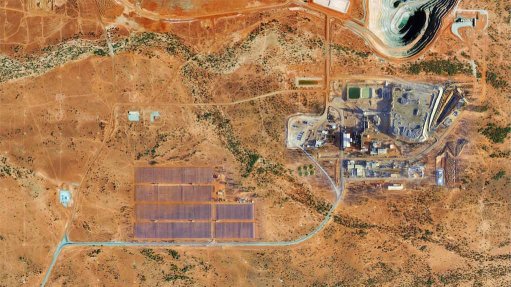
DEGRUSSA PLANT The off-grid hybrid power plant at the DeGrussa copper/gold mine, in western Australia features a solar PV plant, lithium-ion battery facility and a diesel power station
Factors such as limited and unreliable energy transmission and distribution grids, across many countries in sub-Saharan Africa, have created a dependence among large industrial and mining houses on diesel and heavy fuel oil (HFO) to provide a reliable energy supply, says renewable-energy solutions provider juwi Renewable Energies business development manager Monya Bassingthwaighte.
This growing self-dependence in power, coupled with a rapid decrease in solar photovoltaic (PV) pricing, has consequently created prospects for hybridising solar PV with thermal power plants, with or without battery energy storage, depending on the application.
Another factor contributing to the prospects for the growth of renewables in the energy mix is the even higher rate of decline in battery storage costs, translating into a higher adoption of hybrid systems, she notes.
With renewable-energy power systems becoming more cost effective, compared with traditional thermal power systems, Bassingthwaighte points out that a regional impetus is expected on the deployment of these hybrid systems. “It is forecast that the commercial and industrial sectors will contribute the largest market share, as they are typically energy-intensive users and, thus, largely reliant on thermal fossil fuels.”
To meet this growing demand, she highlights, juwi Renewable Energies offers hybridised solar PV and thermal power plant solutions with full technology integration and engineering, procurement and construction (EPC) delivery.
Further, juwi’s hybrid solutions offer a direct cost saving, owing to a reduction in the use of fossil fuels, Bassingthwaighte adds. This saving can currently reach up to 50% of baseline fuel consumption, she says.
Another important financial benefit of hybrid systems is the ability to forecast future energy costs and the associated hedging against the volatility of the oil price, transport costs, exchange rates and the current and future costs of carbon dioxide. Technical benefits include improved energy security, power quality (voltage and frequency) and resolution on the data monitoring of the power plant using juwi’s proprietary hybrid supervisory control and data acquisition software.
In 2016, juwi successfully commissioned what it regards as the world’s largest off-grid hybrid power plant at the DeGrussa copper/gold mine, in western Australia. This plant is a fully integrated, off-grid, solar-battery diesel hybrid system. The system configuration includes a solar PV plant capable of producing 10.6 MWp, and a 4 MW (1.8 MWh) lithium-ion battery facility, which fully integrates with a pre-existing 19 MW diesel power station.
Bassingthwaighte says this hybrid system saves the mine five-million litres (20% of previous consumption) of diesel a year. “This flagship project serves as a global proof of concept for hybridising existing and greenfield mining power infrastructure.”
The company is actively expanding its footprint in sub-Saharan Africa. “We have seen an increase in requests from the region for hybrid solutions and we believe there is significant growth potential going forward,” she concludes.